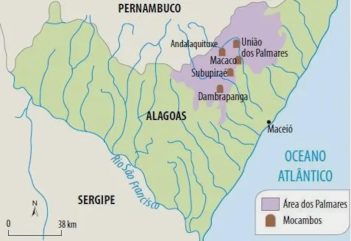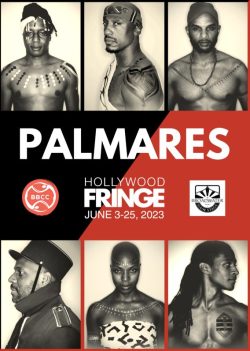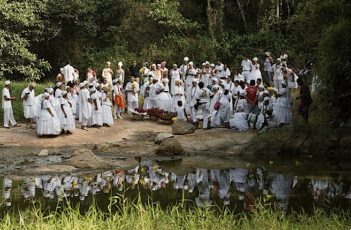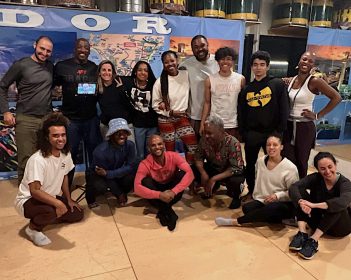By Robert St. Martin
 Los Angeles, CA (The Hollywood Times) 6/17/23 – One of the biggest productions at this year’s Hollywood Fringe Festival is “Palmares,” an ambitious historical play about a settlement of fugitive black slaves established from the early 1600s to 1694 around the regions of Pernambuco in Brazil. This might not seem the easiest topic for a play, but in Brazilian history and legend, it is an important chapter worth bringing to the stage in this lively account at the Broadwater Main Stage in Hollywood. Quilombo dos Palmares was a “quilombo,” a community of escaped slaves and others. Palmares was home to not only escaped enslaved Africans, but also to indigenous peoples, “caboclos,” and poor or marginalized Portuguese settlers, especially Portuguese soldiers trying to escape forced military service. This production of “Palmares” written and directed by Vayabobo with Maurice Shaw incorporates music and Capoeira fight dancing. This production opened at the Broadwater on June 10 and has performances Friday, June 16 at 6:30 p.m.; Saturday, June 17 at 12:30 p.m.; Sunday, June 25 at 1:00 p.m. It is presented by Brasil Cultural Center in Culver City, where it was developed out of the Dia da Consciência Negra celebration started 15 years ago by Mestre Amen and Nayal Santa. This Hollywood Fringe play is produced by Nayla Santo & Earle Cole.
Los Angeles, CA (The Hollywood Times) 6/17/23 – One of the biggest productions at this year’s Hollywood Fringe Festival is “Palmares,” an ambitious historical play about a settlement of fugitive black slaves established from the early 1600s to 1694 around the regions of Pernambuco in Brazil. This might not seem the easiest topic for a play, but in Brazilian history and legend, it is an important chapter worth bringing to the stage in this lively account at the Broadwater Main Stage in Hollywood. Quilombo dos Palmares was a “quilombo,” a community of escaped slaves and others. Palmares was home to not only escaped enslaved Africans, but also to indigenous peoples, “caboclos,” and poor or marginalized Portuguese settlers, especially Portuguese soldiers trying to escape forced military service. This production of “Palmares” written and directed by Vayabobo with Maurice Shaw incorporates music and Capoeira fight dancing. This production opened at the Broadwater on June 10 and has performances Friday, June 16 at 6:30 p.m.; Saturday, June 17 at 12:30 p.m.; Sunday, June 25 at 1:00 p.m. It is presented by Brasil Cultural Center in Culver City, where it was developed out of the Dia da Consciência Negra celebration started 15 years ago by Mestre Amen and Nayal Santa. This Hollywood Fringe play is produced by Nayla Santo & Earle Cole.
 “Palmares” is a unique synthesis of modern storytelling, combined with the richness of Afro-Brazilian culture, including aspect of Capoeira, Maculelé (mock stick-fighting), Afro-Brazilian dance, Candomblè religious practices, drumming, and singing. The drama unfolds as the warriors of Palmares battle against the Portuguese to maintain freedom from being re-enslaved in Brazil. Weary of constant warfare, Ganga Zumba (played by Amen Santo), their leader and king (or Ogum) frees a captured a Bush Captain (a “Bandeirante,” a hunter of escaped African slaves, played by Maurice Shaw), who will double-cross him later. He also frees some captured Portuguese soldiers – Portuguese Commander (Gulu Montiero), Marcelo (Eurico Senna) and another dragoon (Singa Diesner). Ganga Zumba does this, hoping to initiate a truce with the newly appointed Portuguese Governor of the province of Pernambuco.
“Palmares” is a unique synthesis of modern storytelling, combined with the richness of Afro-Brazilian culture, including aspect of Capoeira, Maculelé (mock stick-fighting), Afro-Brazilian dance, Candomblè religious practices, drumming, and singing. The drama unfolds as the warriors of Palmares battle against the Portuguese to maintain freedom from being re-enslaved in Brazil. Weary of constant warfare, Ganga Zumba (played by Amen Santo), their leader and king (or Ogum) frees a captured a Bush Captain (a “Bandeirante,” a hunter of escaped African slaves, played by Maurice Shaw), who will double-cross him later. He also frees some captured Portuguese soldiers – Portuguese Commander (Gulu Montiero), Marcelo (Eurico Senna) and another dragoon (Singa Diesner). Ganga Zumba does this, hoping to initiate a truce with the newly appointed Portuguese Governor of the province of Pernambuco.
 Once freed, the clever Bush Captain returns with a royal document inviting Ganga Zumba to the Portuguese-controlled coastal city of Recife to review the terms for peace. Ganga Zumba’s bid for peace with the Portuguese is opposed by both his wife Dandara the Queen (played by Marquisha Walker) and the General (Xango) of the Palamares army – Zumbi (played by Phillipos Haile). Despite the protestations of his people, Ganga Zumba accepts this invitation and travels to Recife, the capital of Pernambuco to meet with Governor Almeida (Peter Lownds). Is this a real offer or is it a trap? He takes some of his trusted warriors with him to Recife, including Theodoro (Melvin Dawyan Oliver) and João (Ricky T. Johnson) and the fierce female warrior Morena (Tulani Simone, in a fine performance).
Once freed, the clever Bush Captain returns with a royal document inviting Ganga Zumba to the Portuguese-controlled coastal city of Recife to review the terms for peace. Ganga Zumba’s bid for peace with the Portuguese is opposed by both his wife Dandara the Queen (played by Marquisha Walker) and the General (Xango) of the Palamares army – Zumbi (played by Phillipos Haile). Despite the protestations of his people, Ganga Zumba accepts this invitation and travels to Recife, the capital of Pernambuco to meet with Governor Almeida (Peter Lownds). Is this a real offer or is it a trap? He takes some of his trusted warriors with him to Recife, including Theodoro (Melvin Dawyan Oliver) and João (Ricky T. Johnson) and the fierce female warrior Morena (Tulani Simone, in a fine performance).
 Yes, they are received with great pomp in Recife and they do return to Palmares, but we soon discover the nature of the “deal” being offered by the Portuguese is to abandon Palmares and resettle in a fertile valley near Recife. As the Queen and General Zumbi see it, that would be an open invitation to re-enslavement. General Zumbi, played magnificently by Philippe Haile, decides to take matters into his own hands after he consults the Candomblè Priestess Mäe de Santo (Felicia “Onyi’ Richard) who foretells the destruction of Palmares in a vision.
Yes, they are received with great pomp in Recife and they do return to Palmares, but we soon discover the nature of the “deal” being offered by the Portuguese is to abandon Palmares and resettle in a fertile valley near Recife. As the Queen and General Zumbi see it, that would be an open invitation to re-enslavement. General Zumbi, played magnificently by Philippe Haile, decides to take matters into his own hands after he consults the Candomblè Priestess Mäe de Santo (Felicia “Onyi’ Richard) who foretells the destruction of Palmares in a vision.
 The remainder of the play leaves us with a sense of the betrayal of Palmares and the legend that remains to this day of a community of escaped African slaves who created their own republic in the Brazilian jungle. This, of course, is not the only example in the history of the Americas – similar communities of escaped slaves fled into the jungles of Colombia, Jamaica, Nicaragua, and Panama. What makes this play especially interesting is the incorporation of a sort of Greek chorus of “orishas” or African gods who provide much of the historical context of the Palmares story in a very humorous way. Black Exu, an Orixá representing Mind (Ashley Blanchand) teams up with Red Exu, an Orixá representing Body (Oshuunde Shango Oshun) and Strip Exu as Spirit (Jelani Lateel) fly across the stage intermittently to narrate the tale of Palmares.
The remainder of the play leaves us with a sense of the betrayal of Palmares and the legend that remains to this day of a community of escaped African slaves who created their own republic in the Brazilian jungle. This, of course, is not the only example in the history of the Americas – similar communities of escaped slaves fled into the jungles of Colombia, Jamaica, Nicaragua, and Panama. What makes this play especially interesting is the incorporation of a sort of Greek chorus of “orishas” or African gods who provide much of the historical context of the Palmares story in a very humorous way. Black Exu, an Orixá representing Mind (Ashley Blanchand) teams up with Red Exu, an Orixá representing Body (Oshuunde Shango Oshun) and Strip Exu as Spirit (Jelani Lateel) fly across the stage intermittently to narrate the tale of Palmares.
 These Orishas are spirits that play a key role in the Yoruba religion of West Africa and several religions of the African diaspora that derive from it, such as Cuban, Dominican and Puerto Rican Santería and Brazilian Candomblé. The Orishas in this play serve a special function as storytellers and not necessarily linked to the traditional Orichas of Yoruba religion. Their often-humorous commentary on history is a rich and necessary addition to the events on stage.
These Orishas are spirits that play a key role in the Yoruba religion of West Africa and several religions of the African diaspora that derive from it, such as Cuban, Dominican and Puerto Rican Santería and Brazilian Candomblé. The Orishas in this play serve a special function as storytellers and not necessarily linked to the traditional Orichas of Yoruba religion. Their often-humorous commentary on history is a rich and necessary addition to the events on stage.
 Vayabobo scripted the play from a story by himself, Maurice Shaw and Amen Santo. Vayabobo has written extensively for television, including the series In2ition (Disney) and The Nanny (CBS). He co-directs Palmares with Maurice Shaw. Shaw is classically trained in theatre. He received his MFA from UCLA and has appeared extensively in productions with Theatricum Botanicum and Long Beach Shakespeare. Together they have assembled a talented and athletic cast to tell the story of Palmares, which has recently received a lot of buzz after the publication of Gayl Jones’ best-selling novel “Palmares” (2021), the journey of Almeyda, a Black slave girl who comes of age on Portuguese plantations in Brazil and escapes to a fugitive slave settlement called Palmares.
Vayabobo scripted the play from a story by himself, Maurice Shaw and Amen Santo. Vayabobo has written extensively for television, including the series In2ition (Disney) and The Nanny (CBS). He co-directs Palmares with Maurice Shaw. Shaw is classically trained in theatre. He received his MFA from UCLA and has appeared extensively in productions with Theatricum Botanicum and Long Beach Shakespeare. Together they have assembled a talented and athletic cast to tell the story of Palmares, which has recently received a lot of buzz after the publication of Gayl Jones’ best-selling novel “Palmares” (2021), the journey of Almeyda, a Black slave girl who comes of age on Portuguese plantations in Brazil and escapes to a fugitive slave settlement called Palmares.
 The historical background: In 1630 the Dutch West India Company sent a fleet to conquer Pernambuco, the area of Brazil south of Dutch-controlled Surinam and north of Salvador en Bahia, the original capital of Portuguese Brazil. The Dutch-Portuguese War occurred during the period of the Union of Portugal and Spain, which resulted in The Netherlands throwing off the yoke of Spanish rule. Although the Dutch captured and held the city of Recife, they were unable and uninterested in conquering the rest of the province. As a result, there was a constant low-intensity war between Dutch and Portuguese settlers. During this time thousands of enslaved people escaped and went to the Palmares. The vast majority of the enslaved Africans who were brought to Pernambuco were from Portuguese Angola, perhaps as many as 90%, and therefore it is no surprise that tradition, reported as early as 1671 related that its first founders were Angolan. By 1675, thirty thousand free men and women, the majority being escaped African slaves, were living in Palmares.
The historical background: In 1630 the Dutch West India Company sent a fleet to conquer Pernambuco, the area of Brazil south of Dutch-controlled Surinam and north of Salvador en Bahia, the original capital of Portuguese Brazil. The Dutch-Portuguese War occurred during the period of the Union of Portugal and Spain, which resulted in The Netherlands throwing off the yoke of Spanish rule. Although the Dutch captured and held the city of Recife, they were unable and uninterested in conquering the rest of the province. As a result, there was a constant low-intensity war between Dutch and Portuguese settlers. During this time thousands of enslaved people escaped and went to the Palmares. The vast majority of the enslaved Africans who were brought to Pernambuco were from Portuguese Angola, perhaps as many as 90%, and therefore it is no surprise that tradition, reported as early as 1671 related that its first founders were Angolan. By 1675, thirty thousand free men and women, the majority being escaped African slaves, were living in Palmares.
Two descriptions, one an anonymous account called “Relação das Guerras de Palmares” (Account of the war of Palmares, 1678), the other written by Manuel Injosa (1677), describe a large, consolidated entity with nine major settlements and many smaller ones in the area known as Palmares. Slightly later accounts tell us that the kingdom was named “Angola Janga” which according to the Portuguese meant “Little Angola.” The two texts agree that it was ruled by a king, which the “Relação das Guerras” named “Ganga Zumba,” and that members of his family ruled other settlements, suggesting an incipient royal family. He also had officials and judges as well as a more or less standing army. These inhabitants developed a society and government that derived from a range of Central African socio-political models, a reflection of the diverse ethnic origins of its inhabitants, with aspects of European culture and specifically local adaptations. As many of the former slaves had been Christianized, there were churches in the settlements of Palmares as well as ironsmiths, shops, and schools.
Six Portuguese expeditions tried to conquer Palmares between 1680 and 1686 but failed. Finally, the Governor of the Captaincy of Pernambuco, Pedro Almeida, organized an army under the leadership of the Bandeirantes (slave-hunters) Domingos Jorge Velho and Bernando Vieria de Melo and defeated a Palmarista force, putting an end to this African kingdom/republic in 1694.
Felicia “Onyi” Richards served as Associate Producer of “Palmares.” Choreography was the work of Ashley Monique Blanchard, who is a product of the Debbie Allen Academy and a member of Ballet Folklorica do Brasil and performs here at the Orixá Black Exu. George Karpasitis and Amen Santo provides the music and sound design. The interesting costumes were designed by Sanni Diesner. So much work and love went into this production, and I do recommend see the play “Palmares” to learn about an important chapter in the history of Brazil and to better understand the experience of the very large Afro-Brazilian community. It’s a great show and I must say the Capoeira dancing is more than worth the ticket. There are two remaining performances on Saturday, June 17, at 12:30 pm and Sunday, June 25 at 1:00 pm. Hopefully the play will be selected as one of the winners of this year’s Hollywood Fringe Festival and have an encore performance. Tickets are $20.00. Online tickets: http://hollywoodfringe.org/projects/5543




